When Jet Bonanno started his shoestring home-based food operation, he never dreamed it would morph into a thriving brick-and-mortar restaurant. But that’s exactly what happened when Bonanno opened Jet’s American Grill & Bar at the ripe old age of 22.
Jet’s opened in Midtown Sacramento in December 2021 with an eye toward becoming a hip new hangout offering late-night eats. After starting the engine with a New Year’s Eve party featuring live music, the new kid on the block was off and running, serving some 45,000 customers in its first year and 65,000 the second, according to Bonanno, who is already scouting for a second location.
In an industry known for eating its young — first-year restaurant failure rates hover around 60 percent, according to the beverage inventory management platform BinWise — Bonanno knew it was “a big deal,” as he puts it, when Jet’s celebrated its second anniversary a few months ago. What accounts for its success? The friendly-but-focused Bonanno ticks off a foursome of factors: prime location, fun eats and drinks, live music and late-night hours, open until 2 a.m.
Jet Bonanno opened Jet’s American Bar and Grill at 22.

That last piece is especially critical, Bonanno says. “There aren’t many places in Sacramento open past 9 p.m., so that’s where we find a lot of our business,” he says, noting that Jet’s serves food all the way up to closing time. “From 1:30 a.m. to 2 a.m. we are almost always a full house.”
The value of serving customers into the wee hours is something Bonanno learned from the time he began cooking and selling food out of his parents’ Arden Park house. It was spring 2020, the peak of the COVID pandemic, and the Bonanno family was facing a pandemic of its own: Jet’s younger brother, Talon, had taken a turn for the worse in his fight against neuroblastoma, a nerve tissue cancer. Jet (birth name: Trevor Jet), then a junior at Saint Mary’s College in Moraga, decided to move back home to help his ailing brother and the rest of the family: parents Nick and Christine and his two other siblings, older brother Trent (who now co-owns and operates Jet’s) and little sister Lexi.
Starting a food-based business was an unusual choice for a guy who’d never been a cook. But Bonanno had always been entrepreneurial, even as a kid. “I was always trying to start businesses when I was younger, trying to figure out ways to make money,” he says. Given his upbringing, it’s no surprise. Bonanno’s father has owned multiple businesses, and his grandfathers were also entrepreneurs. It was always his plan, Bonanno says, to follow in their footsteps.
In May 2020, stuck at home during the COVID lockdown, he spotted a YouTube video of a guy selling pizza out of his home through Uber Eats. It was a lightbulb moment. “I had $300 left in my bank account and thought, ‘Why don’t I try it?’” Bonanno says. Three days later he was ready to rock with DoorDash, offering a minimalist menu including chicken parmigiana, chicken strips and his all-time favorite food, cheesesteaks (now his No. 1 seller).
The renegade enterprise was a runaway success. “Dashers would be lined up for hours down our block,” Bonanno says. The operation’s late-night hours helped to boost business but detracted from neighborly love. Some filed complaints. Ultimately, Bonanno’s ghost kitchen — where food is prepped for delivery only — was shut down by the city, which snagged him for lacking a permit.
Bonanno’s next move was a food trailer. Between DoorDash earnings and contributions from his brothers, he scraped together the $25,000 to buy a 38-foot Horton Hauler. “The thing was huge — it was pretty much two kitchens,” Bonanno says. “We got it really cheap because no one really wanted a trailer that big.”
Finding a place to park it was a challenge. But after spotting a large parking lot at Gethsemane Lutheran Church, just a few blocks from his parents’ house, Bonanno thought to inquire. The gamble paid off: Pastor Jason Bense allowed him to park the trailer at the church (for a small fee). “I credit a lot of our success to Pastor Jason,” says Bonanno. “He was really the first person outside my family who believed in what I was doing, and he was willing to do whatever he could to help.”
Bonanno was easy to believe in, Bense says. “He didn’t just come to me asking, ‘Can we park in the parking lot?’” says Bense. “He’d written up a full four-page business plan, and his commitment and compassion for his family and his brother with his illness was so evident. It was tough times on all angles.” Indeed it was. Though it’s not mentioned on the “About” page on jetsmidtown.com, Talon Bonanno died in January 2021. “That’s the sad part of the story we really don’t put out there,” he says.
But Bonanno does speak often of familial support, crediting his parents and siblings for much of his success. When the food trailer went operational in October 2020, the whole family jumped into action, with Jet as grill cook, sister Lexi running the deep fryer and brother Trent bagging orders and interfacing with delivery drivers. Bonanno continued building the menu, adding virtual brands that endure today. Business boomed to the tune of 150 customers a night, prompting Bonanno to seek a permanent home for Jet’s. With limited capital, it wasn’t easy. “We were originally looking at some of the not-so-nice neighborhoods in Sacramento because that’s all we could afford,” he says.
When Bonanno found the 20th Street location, the former home of the French bistro Plan B, he also found an ally in chef-owner Lionel Lucas, who was retiring and selling the business. There were other interested parties, but Lucas chose Bonanno. “We just really connected, and he connected with my dad and brother as well,” Bonanno says. “He’d owned like three restaurants, and I think he saw me as a young guy who looked up to him, wanted to be like him someday.” Bonanno also worked with the landlord to take over the lease.
Since its opening more than two years ago, the buzz around Jet’s continues to build, and not just because of the food. Music and themed events — something Bonanno instituted from the start with the help of events coordinator Terry Harry — are also a huge draw. “In the beginning especially, entertainment was critical to bringing people in the door,” Harry says. Also critical during those bumpy early days, Bonanno says, was DoorDash, which brought in consistent revenue (and still does).
Bonanno has used such virtual platforms from the start. But for many veteran restaurateurs, adopting multiple business models — and including a digital delivery-based option in the mix — is a paradigm shift. For Nash & Proper chef-owner Cecil Rhodes, whose K Street restaurant had barely opened when COVID temporarily shut it down, pivoting to a ghost kitchen was both a lifesaver and a growth opportunity. “It gave me a new business model,” says Rhodes, who now juggles several ghost kitchens along with food trucks and his K Street location. Flexibility, he says, is key.
Staying flexible also means listening to your customers and tweaking the menu in response. Over the last year, Bonanno has expanded his playful, comfort-food-with-a-twist menu to include vegan versions of most signature items, from BBQ sandwiches and loaded fries to a vegan cheesesteak, now his No. 2 seller.
For many regulars, it’s the combo of music and food that keeps them coming back. “I’ve been here five or six times, and specifically for the jazz,” says Marcus Royce-Fulton, who was hanging with a pal while grooving to a jazz quartet on a recent Thursday night. But he also loves the food. When asked to name his favorite menu item, his answer comes fast: “Cheesesteaks.”
It’s an answer that brings a big smile to Jet Bonanno’s face.
–
Subscribe to the Comstock’s newsletter today.
Recommended For You
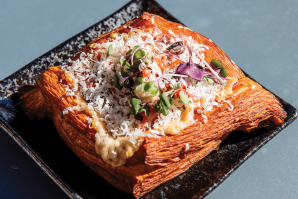
Pop-Up Popularity
Female chefs and bakers find success outside the traditional restaurant model
These nomadic eateries, which surged in popularity around the Great Recession, came in vogue again during the COVID-19 pandemic, often as the only option for cooks in lockdown.
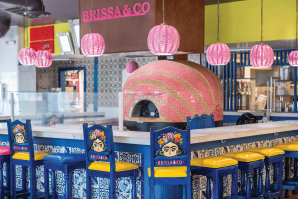
La Dulce Vida
Meet the Capital Region panaderos bringing creative flavors and techniques to Mexican bakery classics
Pan dulce (in English, sweet bread) is being reimagined by intrepid bakers across the Capital Region. Comstock’s recently spoke with three local panaderos who are taking pan dulce to new heights while simultaneously paying tribute to the cultural traditions and food memories that shaped them.
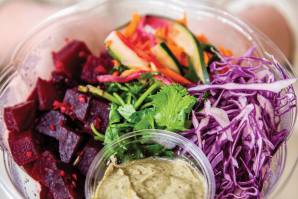
Reset and Drink Up
These Capital Region cafes offer food and drink with a side of health care
Across the region, health food businesses are branching beyond acai bowls and chia-seed puddings to offer customers a broader spectrum of health programs and treatments. From juice cleanses to lattes with a side of ionic detoxification, the spread of these businesses demonstrates that customers are willing to invest in their health — and are looking beyond the traditional health care system to do so.
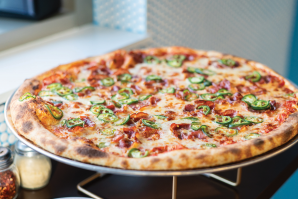
Reeling Them In
Local restaurants use Instagram Reels and TikTok to attract customers
Your experience of social media may be as a fun time-waster, an angst-producing FOMO (fear of missing out) machine or the reason you know your Uncle Dennis believes in ancient aliens. But to many restaurant owners, social media is a necessity.
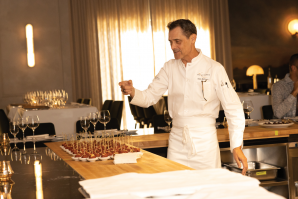
Star Power
The Michelin guide helps put Sacramento restaurants on the map
Winning a Michelin star is something ambitious chefs spend a lifetime dreaming of and working toward. A star from the world-famous Michelin Guide promises life-changing benefits: Money. Customers. Fame. There’s even a term for it: the Michelin effect.

Going to the Dogs
Lodi vineyards and nurseries test canine pest detection
The solution to one of the wine industry’s most costly and threatening problems may be coming soon from Lodi — and it will trot out on four feet, tails a-wagging, with noses keener than even advanced scientific equipment.





